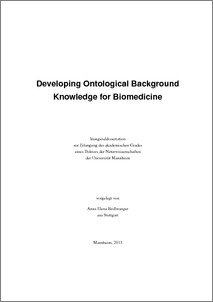|
Developing Ontological Background Knowledge for Biomedicine
Beißwanger, Anna Elena
![[img]](https://madoc.bib.uni-mannheim.de/35191/1.hassmallThumbnailVersion/dissertation_beisswanger.pdf)  Vorschau |
|
PDF
dissertation_beisswanger.pdf
- Veröffentlichte Version
Download (1MB)
|
|
URL:
|
https://ub-madoc.bib.uni-mannheim.de/35191
|
|
URN:
|
urn:nbn:de:bsz:180-madoc-351911
|
|
Dokumenttyp:
|
Dissertation
|
|
Erscheinungsjahr:
|
2013
|
|
Ort der Veröffentlichung:
|
Mannheim
|
|
Hochschule:
|
Universität Mannheim
|
|
Gutachter:
|
Stuckenschmidt, Heiner
|
|
Datum der mündl. Prüfung:
|
24 Mai 2013
|
|
Sprache der Veröffentlichung:
|
Englisch
|
|
Einrichtung:
|
Fakultät für Wirtschaftsinformatik und Wirtschaftsmathematik > Practical Computer Science II: Artificial Intelligence (Stuckenschmidt 2009-)
|
|
Fachgebiet:
|
004 Informatik
|
|
Normierte Schlagwörter (SWD):
|
Wissensmanagement , Ontologie <Wissensverarbeitung> , Wissensrepräsentation
|
|
Freie Schlagwörter (Deutsch):
|
Wissensmanagement , Ontologieentwicklung , Biomedizinische Ontologien
|
|
Freie Schlagwörter (Englisch):
|
knowledge management , ontology development , biomedical ontologies
|
|
Abstract:
|
Biomedicine is an impressively fast developing, interdisciplinary field of
research. To control the growing volumes of biomedical data, ontologies are
increasingly used as common organization structures. Biomedical ontologies
describe domain knowledge in a formal, computationally accessible way. They
serve as controlled vocabularies and background knowledge in applications
dealing with the integration, analysis and retrieval of heterogeneous types
of data. The development of biomedical ontologies, however, is hampered by
specific challenges. They include the lack of quality standards, resulting
in very heterogeneous resources, and the decentralized development of
biomedical ontologies, causing the increasing fragmentation of domain
knowledge across them.
In the first part of this thesis, a life cycle model for biomedical
ontologies is developed, which is intended to cope with these challenges.
It comprises the stages "requirements analysis", "design and
implementation", "evaluation", "documentation and release" and
"maintenance". For each stage, associated subtasks and activities are
specified. To promote quality standards for biomedical ontology
development, an emphasis is set on the evaluation stage. As part of it,
comprehensive evaluation procedures are specified, which allow to assess
the quality of ontologies on various levels. To tackle the issue of
knowledge fragmentation, the life cycle model is extended to also cover
ontology alignments. Ontology alignments specify mappings between related
elements of different ontologies. By making potential overlaps and
similarities between ontologies explicit, they support the integration of
ontologies and help reduce the fragmentation of knowledge.
In the second part of this thesis, the life cycle model for biomedical
ontologies and alignments is validated by means of five case studies. As a
result, they confirm that the model is effective. Four of the case studies
demonstrate that it is able to support the development of useful new
ontologies and alignments. The latter facilitate novel natural language
processing and bioinformatics applications, and in one case constitute the
basis of a task of the "BioNLP shared task 2013", an international
challenge on biomedical information extraction. The fifth case study shows
that the presented evaluation procedures are an effective means to check
and improve the quality of ontology alignments. Hence, they support the
crucial task of quality assurance of alignments, which are themselves
increasingly used as reference standards in evaluations of automatic
ontology alignment systems. Both, the presented life cycle model and the
ontologies and alignments that have resulted from its validation improve
information and knowledge management in biomedicine and thus promote
biomedical research.
|
|
Übersetzung des Abstracts:
|
Die Biomedizin ist ein sich beeindruckend schnell entwickelndes,
interdisziplinäres Forschungsgebiet. Um die immer größer werdenden Mengen
biomedizinischer Daten besser kontrollieren zu können, werden zunehmend
Ontologien als übergreifende Organisationsstrukturen eingesetzt. Sie
beschreiben biomedizinisches Fachwissen in einer formalen, automatisch
verarbeitbaren Form. Bevorzugt werden sie als kontrollierte Vokabulare und
formalisiertes Hintergrundwissen in Anwendungen zur Integration, Analyse
und Abfrage von heterogenen Daten verwendet. Die Entwicklung
biomedizinischer Ontologien steht jedoch derzeit vor gewissen ungelösten
Problemen. Zu diesen zählen der Mangel an Qualitätsstandards, der zu
Ergebnissen von sehr unterschiedlicher Qualität führt, und die dezentrale
Entwicklung biomedizinischer Ontologien, die eine zunehmende Fragmentierung
von formalisiertem Fachwissen zur Folge hat.
Im ersten Teil dieser Arbeit wird ein Lebenszyklusmodell für
biomedizinische Ontologien entwickelt, das helfen soll, die genannten
Probleme zu lösen. Es umfasst die Stufen "Bedarfsanalyse", "Entwurf und
Implementierung", "Evaluation", "Dokumentation und Veröffentlichung" und
"Wartung". Für jede dieser Stufen werden wichtige Teilaufgaben
spezifiziert. Um die Rolle von Qualitätsstandards in der biomedizinischen
Ontologieentwicklung zu stärken, wird der Schwerpunkt auf die
Evaluationsstufe gelegt. Als Bestandteil dieser werden umfassende
Evaluationsverfahren etabliert, die es erlauben, die Qualität von
Ontologien auf verschiedenen Ebenen zu beurteilen. Um das Problem der
Wissensfragmentierung anzugehen, wird das Lebenszyklusmodell auf
Ontologie-Alignments ausgeweitet. Alignments bestehen aus Zuordnungen
ähnlicher Elemente aus verschiedenen Ontologien. Indem sie überschneidungen
und Ähnlichkeiten zwischen Ontologien explizit machen, helfen sie
Ontologien zu verknüpfen und die Fragmentierung von formalisiertem
Fachwissen zu reduzieren.
Im zweiten Teil dieser Arbeit wird das Lebenszyklusmodell für
biomedizinische Ontologien und Alignments anhand von fünf Fallstudien
validiert. Im Ergebnis bestätigen diese die Wirksamkeit des Modells. Vier
der Fallstudien zeigen, dass es in der Lage ist, die Entwicklung nützlicher
biomedizinischer Ontologien und Alignments zu unterstützen. Letztere
ermöglichen neuartige Anwendungen aus den Bereichen der automatischen
Sprachverarbeitung und der Bioinformatik und bilden in einem Fall die
Grundlage einer Aufgabe der "BioNLP Shared Task 2013", eines
internationalen Wettbewerbs in biomedizinischer Informationsextraktion. Die
fünfte Fallstudie zeigt, dass die neu etablierten Evaluationsverfahren ein
wirksames Mittel zur überprüfung und Verbesserung von Ontologie-Alignments
sind. Sie unterstützen damit die wichtige Aufgabe der Qualitätssicherung
von Alignments, welche zunehmend selbst als Referenzstandards in
Evaluationen von automatischen Alignmentsystemen eingesetzt werden. Sowohl
das Lebenszyklusmodell selbst, als auch die Ontologien und Alignments, die
aus dessen Validierung hervorgegangen sind, fördern das Informations- und
Wissensmanagement in der Biomedizin und unterstützen damit die
biomedizinische Forschung.
(Deutsch)
|
 | Das Dokument wird vom Publikationsserver der Universitätsbibliothek Mannheim bereitgestellt. |
 Suche Autoren in Suche Autoren in
Sie haben einen Fehler gefunden? Teilen Sie uns Ihren Korrekturwunsch bitte hier mit: E-Mail
Actions (login required)
 |
Eintrag anzeigen |
|
